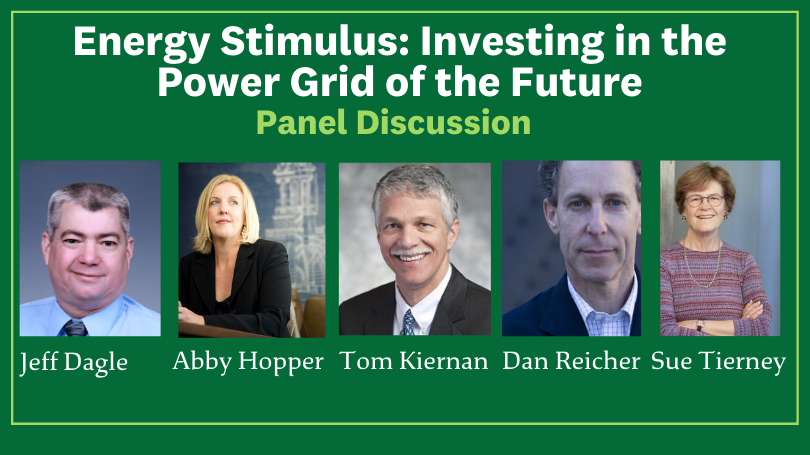
- About
- Education
- Research
- Engagement & Collaboration
- News & Events
Back to Top Nav
Back to Top Nav
Back to Top Nav
Back to Top Nav
Against the backdrop of rapidly worsening climate change, the coronavirus pandemic has created twin crises in public health and economics. Participants in a recent Dartmouth panel discussion contended that when it is safe for people to return to work, the U.S. Congress and private investors should leverage this moment to jumpstart both the country's economic recovery and its urgently needed transition to clean energy systems.
On July 14, the Dartmouth Energy Collaborative (the Irving Institute, the Thayer School, the Revers Center, and the Sustainability Office), convened a Zoom-based panel of five energy experts to discuss the challenges and opportunities presented by prioritizing stimulus spending in the green energy sector for a discussion called "Energy Stimulus: Investing in the Electric Power Grid of the Future." The panel comprised two policy experts, Sue Tierney, senior advisor at Analysis Group and former Assistant Secretary for Policy at the U.S. Department of Energy; Dan Reicher '78, lecturer and senior research scholar at Stanford University and former Department of Energy assistant secretary; two industry representatives, Abby Hopper '93, President and CEO of the Solar Energy Industries Association; and Tom Kiernan '81, President of the American Wind Energy Association; and a cybersecurity expert, Jeff Dagle, Department of Energy, Pacific Northwest National Laboratory. Reicher, Hopper, and Kiernan are also Irving Institute advisory board members.
"Investing in the Grid is an Investment in American Economic Prosperity"
Each panelist took five minutes to highlight what they viewed as the critical investments the nation should make in the electric grid. For Sue Tierney, bolstering long-distance transmission infrastructure, local investments in the grid, and incentivizing both utilities' investment in advanced metering and states' updating siting laws are key. "The grid can be part of the solution as we build up a more resilient economy and put Americans back to work… in a way that positions us better for the future," she concluded.
"Investing in Clean Energy Infrastructure Will Better Position the Country to Deal with Future Crises"
Dan Reicher started off by referencing his experience with developing and implementing the 2009 federal stimulus package, "the largest investment in clean energy" the nation had ever made. While that package resulted in many notable achievements, the fact remains that annual global investments in green energy need to triple. A clean energy stimulus package will help us move the needle. By passing pending infrastructure bills, employing smart tax policies such as extending tax credits for renewables, and investing in innovative clean energy projects, said Reicher, we can "avoid the short-term, shovel ready projects that ultimately constrained the 2009 stimulus efforts," and move toward a more climate friendly planet.
"Investment in Clean Energy Must Be Accompanied by Investing in Racial and Economic Justice"
For Abby Hopper, the current moment presents us with an opportunity to invest in the transformation of not just our energy system but the economic system that creates wealth and opportunity for all people. "I feel compelled to speak… about the trifecta of crises," said Hopper. "The climate crisis...the health crisis, and the racial justice crisis. …They're incredibly intertwined… folks that are more vulnerable to the virus are folks that already have respiratory disease, which are folks that live near fossil fuel generators, which are usually communities of color. We can't divorce one from the other and we need to think about things holistically." Federal dollars can help create a more resilient, sustainable energy system that addresses the health and climate crises, said Hopper, and the clean energy sector needs to ensure that the workforce is equitable, inclusive, and creates opportunities for wealth and empowerment for all.
"We Need to Make the Market More Fair for Renewable Energy Development"
Tom Kiernan urged the federal government to take a comprehensive approach to clean energy investment. It's one thing to have targets, said Kiernan, but we have to have a realistic way to achieve them. Currently, we have significant transmission barriers. "To get to our goals we have to modernize our grid… create markets that are fair [to renewable energy providers], and create more permitting efficiencies so we can have quick decisions." To transform the energy system, we need to think multi-dimensionally. Kiernan echoed Hopper's sentiment that a clean energy economy can be a part of the solution in addressing racial justice issues in the U.S.
"We Need to Go Beyond Simple Cybersecurity and Resiliency to Cyber-Resiliency"
Jeff Dagle focused on the need to keep our energy systems secure and resilient and urged attention to and investment in cybersecurity, resilience, and what he termed "cyber-resilience." Where cybersecurity is intended to "put in place the mechanisms to keep the systems operating and functioning and keep the adversaries at bay," he explains, cyber-resilience recognizes the reality that no security measure is foolproof, so you need to have a mechanism in place to respond quickly and effectively to restore systems in the event of an incident.
Ultimately all the panelists agreed that we have a unique opportunity to invest in the electric grid of the future: sustainable, equitable, secure, and resilient. You can watch a recording of the entire panel discussion here.